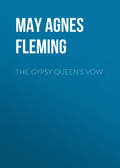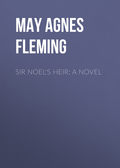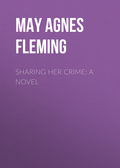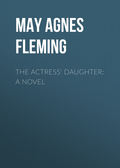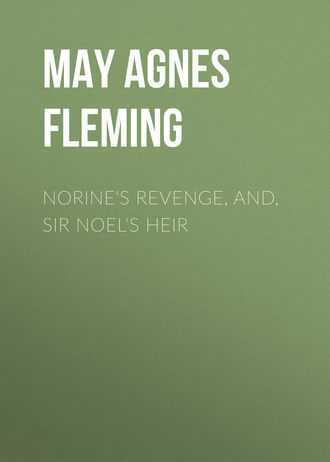
May Agnes Fleming
Norine's Revenge, and, Sir Noel's Heir
CHAPTER II.
CAPT. EVERARD
It was a very grand and stately ceremonial, that funeral procession from Thetford Towers. A week after that stormy December night they laid Sir Noel Thetford in the family vault, where generation after generation of his race slept their last long sleep. The gentry for miles around were there; and among them came the heir-at-law, the Rev. Horace Thetford, only an obscure country curate now, but failing male heirs to Sir Noel, successor to the Thetford estate, and fifteen thousand a year.
In a bed-chamber, luxurious as wealth can make a room, lay Lady Thetford, dangerously ill. It was not a brain fever exactly, but something very like it into which she had fallen, coming out of that death-like swoon. It was all very sad and shocking – the sudden death of the gay and handsome young baronet, and the serious illness of his poor wife. The funeral oration of the Rev. Mr. Knight, rector of St. Gosport, from the words, "In the midst of life we are in death," was most eloquent and impressive; and women with tender hearts shed tears, and men listened with grave, sad faces. It was such a little while, only five short months, since the wedding-bells had rung, and there had been bonfires and feasting throughout the village; and Sir Noel, looking so proud and so happy, had driven up to the illuminated hall with his handsome bride. Only five months; and now – and now.
The funeral was over, and everybody had gone back home – everybody but the Rev. Horace Thetford, who lingered to see the result of my lady's illness, and if she died, to take possession of his estate. It was unutterably dismal in the dark, hushed old house with Sir Noel's ghost seeming to haunt every room – very dismal and ghastly this waiting to step into dead people's shoes. But then there was fifteen thousand a year, and the finest place in Devonshire; and the Rev. Horace would have faced a whole regiment of ghosts, and lived in a vault for that.
But Lady Thetford did not die. Slowly but surely, the fever that had worn her to a shadow left her; and, by and by, when the early primroses peeped through the frost blackened earth, she was able to come down stairs – to come down feeble and frail and weak, colorless as death, almost as silent and cold.
The Rev. Horace went back to Yorkshire, yet not entirely in despair. Female heirs could not inherit Thetford – he stood a chance yet; and the pale young widow was left alone in the dreary old mansion. People were very sorry for her, and came to see her, and begged her to be resigned to her great loss; and Mr. Knight preached endless homilies on patience, and hope, and submission, and Lady Thetford listened to them just as if they had been talking Greek. She never spoke of her dead husband – she shivered at the mention of his name; but that night at his dying bed had changed her as never woman changed before. From a bright, ambitious, pleasure-loving girl, she had grown into a silent, haggard, hopeless woman. All the sunny spring days she sat by the window of her boudoir, gazing at the misty, boundless sea, pale and mute – dead in life.
The friends who came to see her, and Mr. Knight, the rector, were a little puzzled by this abnormal case, but very sorry for the mournful young widow, and disposed to think better of her than ever before. It must surely have been the vilest slander that she had not cared for her husband, that she had married him only for his wealth and title; and that young soldier – that captain of dragoons – must have been a myth. She might have been engaged to him, of course, before Sir Noel came, that seemed to be an undisputed fact; and she might have jilted him for a wealthier lover, that was all a common case. But she must have loved her husband very dearly, or she never would have been broken-hearted like this at his loss.
Spring deepened into summer. The June roses in the flower-gardens of Thetford were in rosy bloom, and my lady was ill again – very, very ill. There was an eminent physician down from London, and there was a frail little mite of babyhood lying amongst lace and flannel; and the eminent physician shook his head, and looked portentously grave as he glanced from the crib to the bed. Whiter than the pillows, whiter than snow, Ada, Lady Thetford, lay, hovering in the Valley of the Shadow of Death; that other feeble little life seemed flickering, too – it was so even a toss-up between the great rival powers, Life and Death, that a straw might have turned the scale either way. So slight being that baby-hold of gasping breath, that Mr. Knight, in the absence of any higher authority, and in the unconsciousness of the mother, took upon himself to baptize it. So a china bowl was brought, and Mrs. Hilliard held the bundle of flannel, and long, white robes, and the child was named – the name which the mother had said weeks ago it was to be called, if a boy – Rupert Noel Thetford; for it was a male heir, and the Rev. Horace's cake was dough.
Days went by, weeks, months, and to the surprise of the eminent physician neither mother nor child died. Summer waned, winter returned; the anniversary of Sir Noel's death came round, and my lady was able to walk down stairs, shivering in the warm air under all her wraps. She had expressed no pleasure or thankfulness in her own safety, or that of her child. She had asked eagerly if it were a boy or a girl; and hearing its sex, had turned her face to the wall, and lay for hours and hours speechless and motionless. Yet it was very dear to her, too, by fits and starts. She would hold it in her arms half a day, sometimes covering it with kisses, with jealous, passionate love, crying over it, and half smothering it with caresses; and then, again, in a fit of sullen apathy, would resign it to its nurse, and not ask to see it for hours. It was very strange and inexplicable, her conduct, altogether; more especially, as with her return to health came no return of cheerfulness or hope. The dark gloom that overshadowed her life seemed to settle into a chronic disease, rooted and incurable. She never went out; she returned no visits; she gave no invitations to those who came to repeat theirs. Gradually people fell off; they grew tired of that sullen coldness in which Lady Thetford wrapped herself as in a mantle, until Mr. Knight and Dr. Gale grew to be almost her only visitors. "Mariana, in the Moated Grange," never led a more solitary and dreary existence than the handsome young widow, who dwelt a recluse at Thetford Towers. For she was very handsome still, of a pale moonlight sort of beauty, the great, dark eyes and abundant dark hair, making her fixed and changeless pallor all the more remarkable.
Months and seasons went by. Summers followed winters, and Lady Thetford still buried herself alive in the gray old manor – and the little heir was six years old. A delicate child still, puny and sickly, petted and spoiled, indulged in every childish whim and caprice. His mother's image and idol – no look of the fair-haired, sanguine, blue-eyed Thetford sturdiness in his little, pinched, pale face, large, dark eyes, and crisp, black ringlets. The years had gone by like a slow dream; life was stagnant enough in St. Gosport, doubly stagnant at Thetford Towers, whose mistress rarely went abroad beyond her own gates, save when she took her little son out for an airing in the pony-phæton.
She had taken him out for one of those airings on a July afternoon, when he had nearly accomplished his seventh year. They had driven seaward some miles from the manor-house, and Lady Thetford and her little boy had got out, and were strolling leisurely up and down the hot, white sands, whilst the groom waited with the pony-phæton just within sight.
The long July afternoon wore on. The sun that had blazed all day like a wheel of fire, dropped lower and lower into the crimson west. The wide sea shone red with the reflections of the lurid glory in the heavens, and the numberless waves glittered and flashed as if sown with stars. A faint, far-off breeze swept over the sea, salt and cold; and the fishermen's boats danced along with the red sunset glinting on their sails.
Up and down, slowly and thoughtfully, the lady walked, her eyes fixed on the wide sea. As the rising breeze met her, she drew the scarlet shawl she wore over her black silk dress closer around her, and glanced at her boy. The little fellow was running over the sands, tossing pebbles into the surf, and hunting for shells; and her eyes left him and wandered once more to the lurid splendor of that sunset on the sea. It was very quiet here, with no living thing in sight but themselves; so the lady's start of astonishment was natural when, turning an abrupt angle in the path leading to the shore, she saw a man coming towards her over the sands. A tall, powerful-looking man of thirty, bronzed and handsome, and with an unmistakably military air, although in plain black clothes. The lady took a second look, then stood stock still, and gazed like one in a dream. The man approached, lifted his hat, and stood silent and grave before her.
"Captain Everard!"
"Yes, Lady Thetford – after eight years – Captain Everard once more."
The deep, strong voice suited the bronzed, grave face, and both had a peculiar power of their own. Lady Thetford, very, very pale, held out one fair jewelled hand.
"Captain Everard, I am very glad to see you again."
He bent over the little hand a moment, then dropped it, and stood looking at her silent.
"I thought you were in India," she said, trying to be at ease. "When did you return?"
"A month ago. My wife is dead. I, too, am widowed, Lady Thetford."
"I am very sorry to hear it," she said, gravely. "Did she die in India?"
"Yes; and I have come home with my little daughter."
"Your daughter! Then she left a child?"
"One. It is on her account I have come. The climate killed her mother. I had mercy on her daughter, and have brought her home."
"I am sorry for your wife. Why did she remain in India?"
"Because she preferred death to leaving me. She loved me, Lady Thetford."
His powerful eyes were on her face – that pale, beautiful face, into which the blood came for an instant at his words. She looked at him, then away over the darkening sea.
"And you, my lady – you gained the desire of your heart, wealth, and a title? Let me hope they have made you a happy woman."
"I am not happy."
"No? But you have been – you were while Sir Noel lived?"
"My husband was very good to me, Captain Everard. His death was the greatest misfortune that could have befallen me."
"But you are young, you are free, you are rich, you are beautiful. You may wear a coronet next time."
His face and glance were so darkly grave, that the covert sneer was almost hidden. But she felt it.
"I shall never marry again, Captain Everard."
"Never? You surprise me! Six years – nay, seven, a widow, and with innumerable attractions. Oh! you cannot mean it."
She made a sudden, passionate gesture – looked at him, then away.
"It is useless – worse than useless, folly, madness, to lift the veil from the irrevocable past. But don't you think, don't you, Lady Thetford, that you might have been equally happy if you had married me?"
She made no reply. She stood gazing seaward, cold and still.
"I was madly, insanely, absurdly in love with pretty Ada Vandeleur in those days, and I think I would have made her a good husband; better, Heaven forgive me, than I ever made my poor dead wife. But you were wise and ambitious, my pretty Ada, and bartered your black eyes and raven ringlets to a higher bidder. You jilted me in cold blood, poor love sick devil that I was, and reigned resplendent as my Lady Thetford. Ah! you knew how to choose the better part, my pretty Ada."
"Captain Everard, I am sorry for the past – I have atoned, if suffering can atone. Have a little pity, and speak of it no more!"
He stood and looked at her silently, gravely. Then he said in a voice deep and calm.
"We are both free. Will you marry me now, Ada?"
"I cannot."
"But I love you – I have always loved you. And you – I used to think you loved me."
He was strangely calm and passionless, voice and glance, and face. But Lady Thetford had covered her face, and was sobbing.
"I did – I do – I always have! But I cannot marry you. I will love you all my life; but don't, don't ask me to be your wife."
"As you please!" he said, in the same passionless voice. "I think it is best myself; for the George Everard of to-day is not the George Everard who loved you eight years ago. We would not be happy – I know that. Ada, is that your son?"
"Yes."
"I should like to look at him. Here, my little baronet! I want to see you."
The boy, who had been looking curiously at the stranger, ran up at a sign from his mother. The tall captain lifted him in his arms and gazed in his small, thin face, with which his bright tartan plaid contrasted harshly.
"He hasn't a look of the Thetfords. He is your own son, Ada. My little baronet, what is your name?"
"Sir Rupert Thetford," answered the child, struggling to get free. "Let me go – I don't know you!"
The captain set him down with a grim smile; and the boy clung to his mother's skirts, and eyed the tall stranger askance.
"I want to go home, mamma. I'm tired and hungry."
"Presently, dearest. Run to William, he has cakes for you. Captain Everard, I shall be happy to have you at dinner."
"Thanks; but I must decline. I go back to London to-night. I sail for India again in a week."
"So soon! I thought you meant to remain."
"Nothing is further from my intention. I merely brought my little girl over to provide her a home; that is why I have troubled you. Will you do me this kindness, Lady Thetford?"
"Take your little girl? Oh! most gladly – most willingly."
"Thanks. Her mother's people are French, and I know little about them; and, save yourself, I can claim friendship with few in England. She will be poor; I have settled on her all I am worth – some three hundred a year; and you, Lady Thetford, you teach her, when she grows up, to catch a rich husband."
She took no notice of the taunt; she looked only too happy to render him this service.
"I am so pleased! She will be such a nice companion for Rupert. How old is she?"
"Nearly four."
"Is she here?"
"No; she is in London. I will fetch her down in a day or two."
"What do you call her?"
"Mabel – after her mother. Then it is settled, Lady Thetford, I am to fetch her?"
"I shall be delighted. But won't you dine with me?"
"No. I must catch the evening train. Farewell, Lady Thetford, and many thanks. In three days I will be here again."
He lifted his hat, and walked away. Lady Thetford watched him out of sight, and then turned slowly, as she heard her little boy calling to her with shrill impatience. The red sunset had faded out; the sea lay gray and cold under the twilight sky; and the evening breeze was chill. Changes in sky, and sea, and land, told of coming night; and Lady Thetford, shivering slightly in the rising wind, hurried away to be driven home.
CHAPTER III.
"LITTLE MAY."
On the evening of the third day after this interview, a fly from the railway drove up the long, winding avenue leading to the great front entrance of the Thetford mansion. A bronzed military gentleman, a nurse, and a little girl, occupied the fly, and the gentleman's keen, dark eyes wandered searchingly around. Swelling meadows, velvety lawns, sloping terraces, waving trees, bright flower-gardens, quaint old fish-ponds, sparkling fountains, a wooded park, with sprightly deer – that was what he saw, all bathed in the golden halo of the summer sunset. Massive and grand, the old house reared its gray head, half overgrown with ivy and climbing roses. Gaudy peacocks strutted on the terraces; a graceful gazelle flitted out for an instant amongst the trees to look at them, and then fled in affright; and the barking of half a dozen mastiffs greeted their approach noisily.
"A fine place," thought Capt. Everard. "My pretty Ada might have done worse. A grand old place for that puny child to inherit. The staunch old warrior-blood of the Thetfords is sadly adulterated in his pale veins, I fancy. Well, my little May, and how are you going to like all this?"
The child, a bright-faced little creature, with great, restless, sparkling eyes, and rose-bloom cheeks, was looking in delight at a distant terrace.
"See, papa! See all the pretty peacocks! Look, Ellen," to the nurse, "three, four, five! Oh, how pretty!"
"Then little May will like to live here, where she can see pretty peacocks every day?"
"And all the pretty flowers, and the water, and the little boy – where's the little boy, papa?"
"In the house – you'll see him presently; but you must be very good, little May, and not pull his hair, and scratch his face, and put your fingers in his eyes, as you used to do with Willie Brandon. Little May must learn to be good."
Little May put one rosy finger in her mouth, and set her head on one side like a defiant canary. She was one of the prettiest little fairies imaginable, with her pale flaxen curls, sparkling light-gray eyes, and apple-blossom complexion; but she was evidently as much spoiled as small Sir Rupert Thetford himself.
Lady Thetford sat in the long drawing-room, after her solitary dinner, and little Sir Rupert played with his rocking-horse, and a pile of picture-books in a remote corner. The young widow lay back in the violet-velvet depths of a carved and gilded lounging-chair very simply dressed in black and crimson, but looking very fair and stately withal. She was watching her boy with a half smile on her face, when a footman entered with Captain Everard's card. Lady Thetford looked up eagerly.
"Show Captain Everard up at once."
The footman bowed and disappeared. Five minutes later, and the tall captain and his little daughter stood before her.
"At last!" said Lady Thetford, rising and holding out her hand to her old lover, with a smile that reminded him of other days – "at last, when I was growing tired waiting. And this is your little girl —my little girl from henceforth? Come here, my pet, and kiss your new mamma."
She bent over the little one, kissing the pink cheek and rosy lips.
"She is fair and tiny – a very fairy; but she resembles you, nevertheless, Captain Everard."
"In temper – yes," said the captain. "You will find her spoiled, and wilful, cross, and capricious, and no end of trouble. Won't she, May?"
"She will be the better match for Rupert on that account," Lady Thetford said, smiling, and unfastening little Miss Everard's wraps with her own fair fingers. "Come here, Rupert, and welcome your new sister."
The young baronet approached, and dutifully kissed little May, who put up her rosebud mouth right willingly. Sir Rupert Thetford was not tall, rather undersized, and delicate for his seven years; but he was head and shoulders over the flaxen-haired fairy, with the bright gray eyes.
"I want a ride on your rocking-horse," cried little May, fraternizing with him at once; "and oh! what nice picture-books, and what a lot!"
The children ran off together to their distant corner, and Captain Everard sat down for the first time.
"You have not dined?" said Lady Thetford. "Allow me to – " her hand was on the bell, but the captain interposed.
"Many thanks – nothing. We dined at the village; and I leave again by the seven-fifty train. It is past seven now, so I have but little time to spare. I fear I am putting you to a great deal of trouble; but May's nurse insists on being taken back to London to-night."
"It will be of no consequence," replied Lady Thetford, "Rupert's nurse will take charge of her. I intend to advertise for a nursery-governess in a few days. Rupert's health has always been so extremely delicate, that he has not even made a pretext of learning yet, and it is quite time. He grows stronger, I fancy; but Dr. Gale tells me frankly his constitution is dangerously weak."
She sighed as she spoke, and looked over to where he stood beside little May who had mounted the rocking-horse boy-fashion. Sir Rupert was expostulating.
"You oughtn't to sit that way – ask mamma. You ought to sit side-saddle. Only boys sit like that."
"I don't care!" retorted Miss Everard, rocking more violently than ever. "I'll sit whatever way I like! Let me alone!"
Lady Thetford looked at the captain with a smile.
"Her father's daughter, surely! bent on having her own way. What a fairy it is! and yet such a perfect picture of health."
"Mabel never was ill an hour in her life, I believe," said her father; "she is not at all too good for this world. I only hope she may not grow up the torment of your life – she is thoroughly spoiled."
"And I fear if she were not, I should do it. Ah! I expect she will be a great comfort to me, and a world of good to Rupert. He has never had a playmate of his own years, and children need children as much as they need sunshine."
They sat for ten minutes conversing gravely, chiefly on business matters connected with little May's annuity – not at all as they had conversed three days before by the seaside. Then, as half-past seven drew near, the captain arose.
"I must go. I will hardly be in time as it is. Come here, little May, and bid papa good-by."
"Let papa come to May," responded his daughter, still rocking. "I can't get off."
Captain Everard laughed; went over, bent down and kissed her.
"Good-by, May; don't forget papa, and learn to be a good girl. Good-by, baronet; try and grow strong and tall. Farewell, Lady Thetford, with my best thanks."
She held his hand, looking up in his sunburned face with tears in her dark eyes.
"We may never meet again, Captain Everard," she said, hurriedly. "Tell me before we part that you forgive me the past."
"Truly, Ada, and for the first time. The service you have rendered me fully atones. You should have been my child's mother – be a mother to her now. Good-by, and God bless you and your boy."
He stooped over, touched her cheek with his lips reverentially, and then was gone. Gone forever – never to meet those he left behind this side of eternity.
Little May bore the loss of her papa and nurse with philosophical indifference; her new playmate sufficed for both. The children took to one another with the readiness of childhood – Rupert all the more readily that he had never before had a playmate of his own years. He was naturally a quiet child, caring more for his picture-books, and his nurse's stories, than for tops, or balls, or marbles. But little May Everard seemed from the first to inspire him with some of her own superabundant vitality and life. The child was never, for a single instant, quiet; she was the most restless, the most impetuous, the most vigorous little creature that can be conceived. Feet, and tongue, and hands, never were still from morning till night; and the life of Sir Rupert's nurse, hitherto one of idle ease, became all at once a misery to her. The little girl was everywhere – everywhere; especially where she had no business to be; and nurse never knew an easy moment for trotting after her, and rescuing her from all sorts of perils. She could climb like a cat, or a goat; and risked her neck about twenty times per diem; she sailed her shoes in her soup, and washed her hands in her milk-and-water. She became the intimate friend of the pretty peacocks, and the big, good-tempered dogs, with whom, in utter fearlessness, she rolled about in the grass half the day. She broke young Rupert's toys, tore his picture-books, slapped his face, pulled his hair, and made herself master of the situation before she had been twenty-four hours in the house. She was thoroughly and completely spoiled. What India nurses had left undone, injudicious petting and flattery, on the homeward passage, had completed, and her temper was something appalling. Her shrieks of passion at the slightest contradiction of her imperial will rang through the house, and rent the tortured tympanums of all who heard. The little Xantippe would fling herself flat on the carpet, and literally scream herself black in the face, until, in dread of apoplexy and sudden death, her frightened hearers hastened to yield. Of course, one such victory insured all the rest. As for Sir Rupert, before she had been a week at Thetford Towers, he dared not call his soul his own. She had partially scalped him on several occasions, and left the mark of her cat-like nails in his tender visage; but her venomous power of screeching for hours at will, had more to do with the little baronet's dread of her than anything else. He fled ingloriously in every battle – running in tears to mamma, and leaving the field and the trophies of victory triumphantly to Miss Everard. With all this, when not thwarted – when allowed to smash toys, and dirty her clothes, and smear her infantile face, and tear pictures, and torment inoffensive lapdogs; when allowed, in short, to follow "her own sweet will," little May was as charming a fairy as ever the sun shone on. Her gleeful laugh made music in the dreary old rooms, such as had never been heard there for many a day, and her mischievous antics were the delight of all who did not suffer thereby. The servants petted and indulged her, and fed her on unwholesome cakes and sweetmeats, and made her worse and worse every day of her life.
Lady Thetford saw all this with inward apprehension. If her ward was completely beyond her power of control at four, what would she be a dozen years hence.
"Her father was right," thought the lady. "I am afraid she will give me a great deal of trouble. I never saw so headstrong, so utterly unmanageable a child."
But Lady Thetford was very fond of the fairy despot withal. When her son came running to her for succor, drowned in tears, and bearing the marks of little May's claws, his mother took him in her arms and kissed him and soothed him – but she never punished the offender. As for Sir Rupert, he might fly ignominiously, but he never fought back. Little May had the hair-pulling and face-scratching all to herself.
"I must get a governess," mused Lady Thetford. "I may find one who can control this little vixen; and it is really time that Rupert began his studies. I will speak to Mr. Knight about it."
Lady Thetford sent that very day to the rector her ladyship's compliments, the servant said, and would Mr. Knight call at his earliest convenience. Mr. Knight sent in answer to expect him that same evening; and on his way he fell in with Dr. Gale, going to the manor-house on a professional visit.
"Little Sir Rupert keeps weakly," he said; "no constitution to speak of. Not at all like the Thetfords – splendid old stock, the Thetfords, but run out – run out. Sir Rupert is a Vandeleur, inherits his mother's constitution – delicate child, very."
"Have you seen Lady Thetford's ward?" inquired the clergyman, smiling: "no hereditary weakness there, I fancy. I'll answer for the strength of her lungs at any rate. The other day she wanted Lady Thetford's watch for a plaything; she couldn't have it, and down she fell flat on the floor in what her nurse calls 'one of her tantrums.' You should have heard her, her shrieks were appalling."
"I have," said the doctor with emphasis; "she has the temper of the old demon. If I had anything to do with that child, I should whip her within an inch of her life – that's all she wants, lots of whipping. The Lord only knows the future, but I pity her prospective husband."
"The taming of the shrew," laughed Mr. Knight. "Katharine and Petruchio over again. For my part, I think Lady Thetford was unwise to undertake such a charge. With her delicate health it is altogether too much for her."
The two gentlemen were shown into the library, while the servant went to inform his lady of their arrival. The library had a French window opening upon a sloping lawn, and here, chasing butterflies in high glee, were the two children – the pale, dark-eyed baronet, and the flaxen-tressed little East Indian.
"Look," said Dr. Gale. "Is Sir Rupert going to be your Petruchio? Who knows what the future may bring forth – who knows that we do not behold the future Lady Thetford?"
"She is very pretty," said the rector, thoughtfully, "and she may change with years. Your prophecy may be fulfilled."
The present Lady Thetford entered as he spoke. She had heard the remarks of both, and there was an unusual pallor and gravity in her face as she advanced to receive them.
Little Sir Rupert was called in, May followed, with a butterfly crushed to death in each fat little hand.
"She kills them as fast as she catches them," said Sir Rupert, ruefully. "It's cruel, isn't it, mamma?"
Little May, quite abashed, displayed her dead prizes, and cut short the doctor's conference by impatiently pulling her play-fellow away.
"Come, Rupert, come," she cried. "I want to catch the black one with the yellow wings. Stick your tongue out and come."
Sir Rupert displayed his tongue, and submitted his pulse to the doctor, and let himself be pulled away by May.
"The gray mare in that team is decidedly the better horse," laughed the doctor. "What a little despot in pinafores it is."
When her visitors had left, Lady Thetford walked to the window and stood watching the two children racing in the sunshine. It was a pretty sight, but the lady's face was contracted with a look of pain.
"No, no," she thought. "I hope not – I pray not. Strange! but I never thought of the possibility before. She will be poor, and Rupert must marry a rich wife, so that if – "
She paused with a sort of shudder; then added:
"What will he think, my darling boy, of his father and mother, if that day ever comes!"



